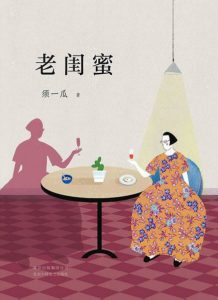Blue Amber
淡蓝琥珀
China, 2018, colour, 2.35:1, 96 mins.
Director: Zhou Jie 周劼.
Rating: 6/10.
Boldly structured, light psycho-drama is an interesting but uninvolving experiment.
Chongqing municipality, central China, the present day. Originally from the north, He Jie (Wang Zhen’er) works as a live-in maid for yuppie couple Yang Lei (Geng Le), his wife Jiang Dan (Zhang Yao) and their young son Yang Leyan (Zhang Yuxuan). Yang Lei is easygoing but Jiang Dan is more demanding and wary of her husband and He Jie getting too close; their son, however, likes He Jie, who takes him to school every day. He Jie used to be married, to Feng (Lv Yulai), who one night was killed by a car while walking his beloved dog Xiaobai. In accordance with the law, He Jie was paid a generous RMB300,000 compensation by the car’s owners (Mo Han, Xue Ling) but, egged on by her sick mother-in-law (Wang Caiping), she has gradually become obsessed by the fact that the sum is equivalent to only RMB25 for each day of Feng’s life. She starts to secretly harass the owners in their gated apartment compound.
REVIEW
Polished direction, a challenging structure, and a strong performance by lead actress Wang Zhen’er 王真儿 make Blue Amber 淡蓝琥珀 always intriguing, even if it’s not always clear in what direction it’s going. A light psycho-drama, centred on a maid working for a yuppie couple in Chongqing, central China, it has a free-flowing structure that moves backwards and forwards in time with no warning, initially challenging the audience to assemble the pieces into a cohesive narrative. The film does finally build into a rounded portrait of its central character but the highly controlled direction is actually the movie’s biggest flaw, never really engaging the viewer on an emotional level. An interesting experiment, it crashed at the Mainland box office, taking an invisible RMB230,000.
The film is the feature debut of Gansu-born Zhou Jie 周劼, 35, who began his career at Chongqing TV and later moved into online drama and shorts. It’s an adaptation of the novella A Life of 240 Months 二百四十个月的一生 by Xiamen-based writer Xu Yigua 须一瓜 (pen name of journalist Xu Ping 徐苹), two of whose crime novels have already been filmed – as the very fine The Dead End 烈日灼心 (2015) and the rather less fine Lost in the Moonlight 夜色撩人 (2017). Her 40-page story was first serialised in 2008 and later  published in the 2016 collection 老闺蜜 (“Old Girlfriends”, see cover, left). The screenplay was co-written by Zhou’s wife, Zhao Xiaoqiu 赵晓秋, who also worked on his shorts Blind 盲 (2013) and My Only Farewell 一次告别 (2015).
published in the 2016 collection 老闺蜜 (“Old Girlfriends”, see cover, left). The screenplay was co-written by Zhou’s wife, Zhao Xiaoqiu 赵晓秋, who also worked on his shorts Blind 盲 (2013) and My Only Farewell 一次告别 (2015).
The structure scrambles moments from the heroine’s recent life into an almost impressionistic mix: the audience hears of events before they’re shown on screen (such as her leaving the yuppie couple’s employment) as well as learning more details of events already seen in flashbacks. It’s a bold approach that’s anchored by Wang’s versatile performance but which also begs a question: would Blue Amber have been just as, if not more, effective, as a linear, developing narrative? Adding to the film’s emotional alienation is that, at the end of the day, the central character is hardly sympathetic: rather than being exploited, she’s part and parcel of a society that’s portrayed as money-obsessed at every level. Her fixation with the compensation for her husband’s death in a traffic accident – which she analyses as worth only RMB25 for each day of his life – ultimately causes her own downfall, as well as that of others. Maybe that’s the point.
Jiangsu-born Wang, 30, earlier known as Wang Zhen 王振, has so far spread her career across film (Love Angel 小城大爱, 2009; supporting roles in American Dreams in China 中国合伙人, 2013, and Battle of Memories 记忆大师, 2017), TV dramas and (more recently) online movies, the last including recent psycho-thrillers Lost in Time 迷失地铁 (2018), largely set on a speeding underground train, and 梦魇效应 (2018, literally “Nightmare Effect”). In Blue Amber she finally gets a meaty leading role and rises to the challenge, but she’s too often undercut by the screenplay and cool direction in creating an empathetic character. Other roles, though briefer, are succinctly drawn: the always reliable Geng Le 耿乐 as her sympathetic employer, versatile Zhang Yao 张瑶 as his waspish, suspicious wife, and indie regular Lv Yulai 吕聿来 as the heroine’s ingenuous young husband.
Two key crew – d.p. Ouyang Yongfeng 欧阳永锋 and composer Liu Zhiqiang 刘志强 – hail from Macau, where Zhou’s short My Only Farewell was set and shot. Ouyang’s clean, well-composed photography – with slightly warmer hues for flashbacks to happier moments – is always good to look at; more of the atmospheric chamber score (piano, cello etc.) by Liu (Sisterhood 骨妹, 2016) would have been useful. Dialogue is a mixture of Chongqing dialect and standard Mandarin, further underlining that the main character, who’s originally from the north, is marginally perceived as an outsider.
CREDITS
Presented by iQiyi Pictures (Shanghai) (CN). Produced by CAMlife Film Production (CN).
Script: Zhao Xiaoqiu, Zhou Jie. Novella: Xu Yigua. Photography: Ouyang Yongfeng. Editing: Zhang Yifan. Music: Liu Zhiqiang. Art direction: Geng Huafeng. Costumes: Yu Qing. Sound: Du Duzhi, Jiang Lianzhen. Visual effects: Wu Shijie (Beijing Phenom Films). Executive direction: Yang Xiao.
Cast: Wang Zhen’er (He Jie/Lotus), Lv Yulai (Feng), Geng Le (Yang Lei), Zhang Yao (Jiang Dan), Wang Caiping (Feng’s mother), Mo Han (Xiao, boss), Xue Ling (Xiao’s wife), Zeng Binfeng (Xu), Zhang Yuxuan (Yang Leyan), Qiu Yunhu (spiritualist), Gao Jing (Wang, matchmaker), Luo Yixiang (courier), Wang Yilai (guide), Sun Yi (He Jie’s younger brother), Yang Yang, Huang Dihao (tenants).
Premiere: Shanghai Film Festival (Asian New Talent Awards), 20 Jun 2018.
Release: China, 17 Dec 2018.
